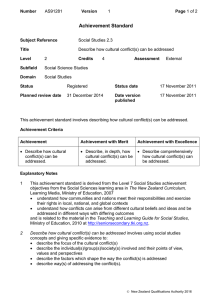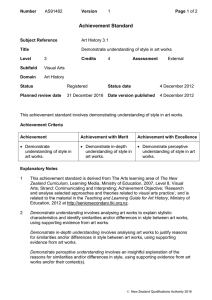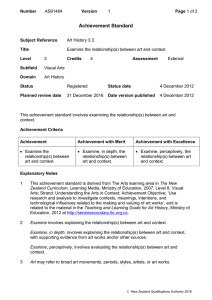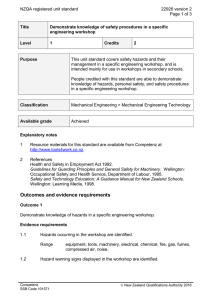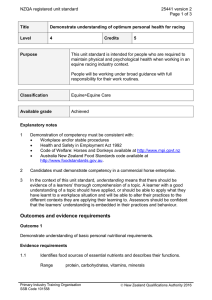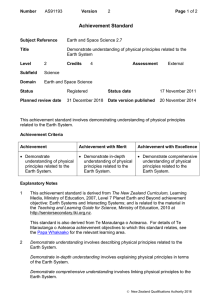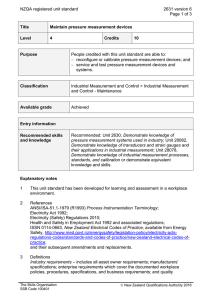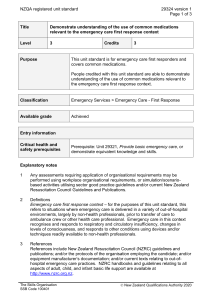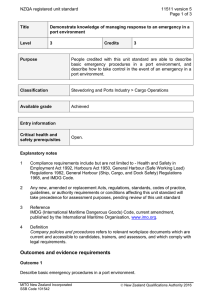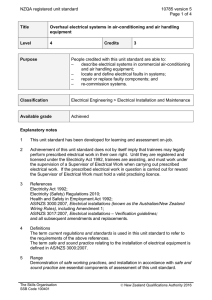Document 15221884
advertisement
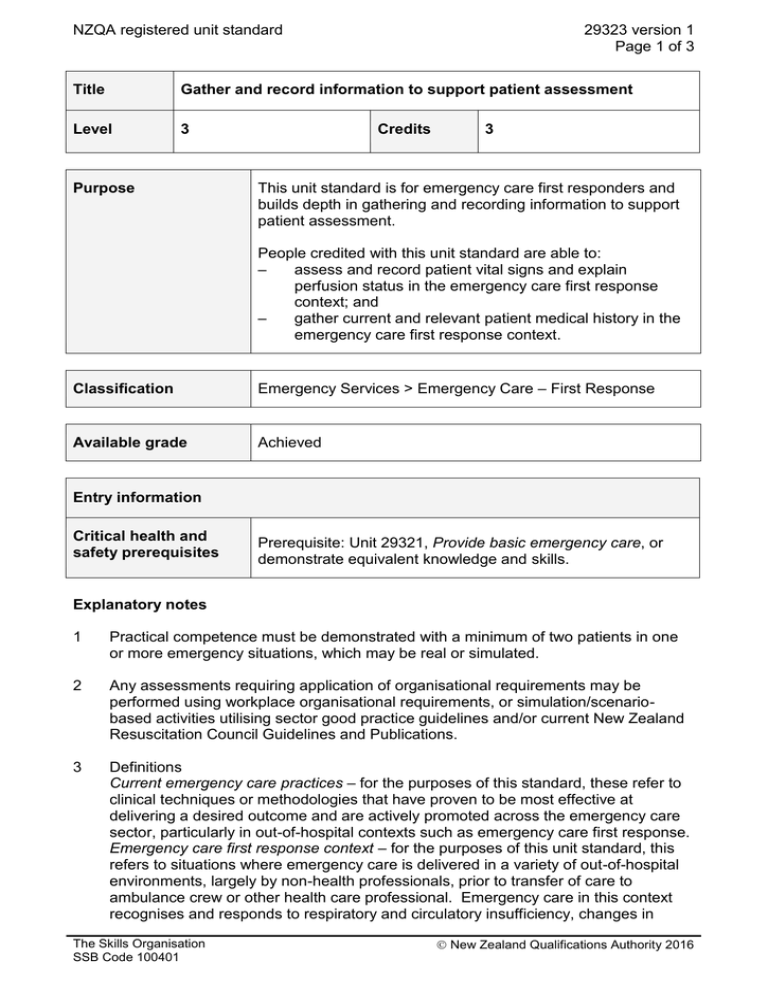
NZQA registered unit standard 29323 version 1 Page 1 of 3 Title Gather and record information to support patient assessment Level 3 Purpose Credits 3 This unit standard is for emergency care first responders and builds depth in gathering and recording information to support patient assessment. People credited with this unit standard are able to: – assess and record patient vital signs and explain perfusion status in the emergency care first response context; and – gather current and relevant patient medical history in the emergency care first response context. Classification Emergency Services > Emergency Care – First Response Available grade Achieved Entry information Critical health and safety prerequisites Prerequisite: Unit 29321, Provide basic emergency care, or demonstrate equivalent knowledge and skills. Explanatory notes 1 Practical competence must be demonstrated with a minimum of two patients in one or more emergency situations, which may be real or simulated. 2 Any assessments requiring application of organisational requirements may be performed using workplace organisational requirements, or simulation/scenariobased activities utilising sector good practice guidelines and/or current New Zealand Resuscitation Council Guidelines and Publications. 3 Definitions Current emergency care practices – for the purposes of this standard, these refer to clinical techniques or methodologies that have proven to be most effective at delivering a desired outcome and are actively promoted across the emergency care sector, particularly in out-of-hospital contexts such as emergency care first response. Emergency care first response context – for the purposes of this unit standard, this refers to situations where emergency care is delivered in a variety of out-of-hospital environments, largely by non-health professionals, prior to transfer of care to ambulance crew or other health care professional. Emergency care in this context recognises and responds to respiratory and circulatory insufficiency, changes in The Skills Organisation SSB Code 100401 New Zealand Qualifications Authority 2016 NZQA registered unit standard 29323 version 1 Page 2 of 3 levels of consciousness, and responds to other conditions using devices and/or techniques readily available to non-health professionals. 4 References References include New Zealand Resuscitation Council (NZRC) guidelines and publications; and/or the protocols of the organisation employing the candidate; and/or equipment manufacturer’s documentation; and/or current texts relating to out-ofhospital emergency care practices. NZRC handbooks and guidelines relating to all aspects of adult, child, and infant basic life support are available at http://www.nzrc.org.nz. 5 Range All procedures in this unit standard should be carried out: a according to current emergency care practices; b in a manner that will not exacerbate the patient’s condition; and c in compliance with the Health and Safety at Work Act 2015, and subsequent amendments. Outcomes and evidence requirements Outcome 1 Assess and record patient vital signs and explain perfusion status in the emergency care first response context. Range inclusion or exclusion of range items must be justified in relation to the patient condition. Evidence requirements 1.1 Vital signs are assessed and recorded to ascertain if they are within normal parameters. Range 1.2 includes but is not limited to – level of consciousness, pulse, respirations, blood pressure, skin, pupils. Explain perfusion status. Range includes but is not limited to – presence of carotid; femoral and radial pulses; skin colour, temperature and dryness; level of consciousness as a measure of brain perfusion. Outcome 2 Gather current and relevant patient medical history in the emergency care first response context. Evidence requirements 2.1 Identify the relevant components of a patient’s medical history. The Skills Organisation SSB Code 100401 New Zealand Qualifications Authority 2016 NZQA registered unit standard 29323 version 1 Page 3 of 3 2.2 Gather information from a patient and other parties to establish current and relevant medical history. 2.3 Information communicated by others is checked for comprehension, interpretation, and clarity of intent. 2.4 Record the history, examination, and treatment in a concise and logical manner consistent organisational privacy requirements. Planned review date 31 December 2020 Status information and last date for assessment for superseded versions Process Version Date Last Date for Assessment Registration 1 10 December 2015 N/A Consent and Moderation Requirements (CMR) reference 0003 This CMR can be accessed at http://www.nzqa.govt.nz/framework/search/index.do. Please note Providers must be granted consent to assess against standards (accredited) by NZQA, before they can report credits from assessment against unit standards or deliver courses of study leading to that assessment. Industry Training Organisations must be granted consent to assess against standards by NZQA before they can register credits from assessment against unit standards. Providers and Industry Training Organisations, which have been granted consent and which are assessing against unit standards must engage with the moderation system that applies to those standards. Requirements for consent to assess and an outline of the moderation system that applies to this standard are outlined in the Consent and Moderation Requirements (CMRs). The CMR also includes useful information about special requirements for organisations wishing to develop education and training programmes, such as minimum qualifications for tutors and assessors, and special resource requirements. Comments on this unit standard Please contact the reviewcomments@skills.org.nz if you wish to suggest changes to the content of this unit standard. The Skills Organisation SSB Code 100401 New Zealand Qualifications Authority 2016
